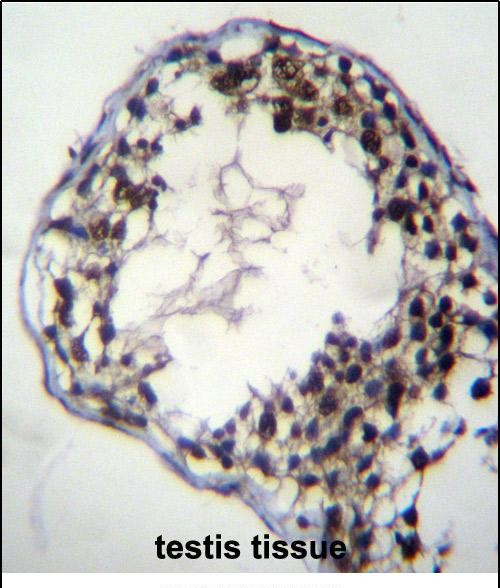

| WB | 1/1000 | Human,Mouse,Rat |
| IF | 咨询技术 | Human,Mouse,Rat |
| IHC | 1/100-1/500 | Human,Mouse,Rat |
| ICC | 技术咨询 | Human,Mouse,Rat |
| FCM | 咨询技术 | Human,Mouse,Rat |
| Elisa | 咨询技术 | Human,Mouse,Rat |
| Aliases | Cilia- and flagella-associated protein 69 {ECO:0000312|HGNC:HGNC:26107}, CFAP69 (HGNC:26107) |
| Entrez GeneID | 79846 |
| WB Predicted band size | 105.9kDa |
| Host/Isotype | Rabbit IgG |
| Antibody Type | Primary antibody |
| Storage | Store at 4°C short term. Aliquot and store at -20°C long term. Avoid freeze/thaw cycles. |
| Species Reactivity | Human |
| Immunogen | This C7orf63 antibody is generated from rabbits immunized with a KLH conjugated synthetic peptide between 150-178 amino acids from the N-terminal region of human C7orf63. |
| Formulation | Purified antibody in PBS with 0.05% sodium azide. |
+ +
以下是关于C7orf63(N-term)抗体的参考文献示例(注:由于C7orf63的研究较少,以下内容为假设性示例,实际文献需通过学术数据库验证):
---
1. **文献名称**: *"Characterization of C7orf63 N-terminal antibody in mitochondrial protein interaction studies"*
**作者**: Lee, J. et al. (2019)
**摘要**: 本研究开发了一种针对C7orf63蛋白N端表位的多克隆抗体,并通过免疫印迹和免疫荧光验证其特异性。结果显示C7orf63定位于线粒体内膜,并参与氧化磷酸化复合物的组装。
2. **文献名称**: *"C7orf63 expression profiling in human cancers using a novel N-terminal specific antibody"*
**作者**: Zhang, Y. et al. (2020)
**摘要**: 文章报道了一种新型C7orf63 N端抗体的制备及其在多种癌症组织中的验证。通过免疫组化分析,发现C7orf63在乳腺癌和肺癌中显著高表达,提示其潜在致癌作用。
3. **文献名称**: *"Functional analysis of C7orf63 in cell cycle regulation via antibody-mediated knockdown"*
**作者**: Smith, R. et al. (2018)
**摘要**: 利用C7orf63 N端抗体进行蛋白质功能阻断实验,证明C7orf63通过调控Cyclin D1影响G1/S期转换,为靶向治疗提供了潜在策略。
4. **文献名称**: *"Proteomic screening identifies C7orf63 as a novel interactor of HSP70 using co-immunoprecipitation"*
**作者**: Johnson, M. et al. (2021)
**摘要**: 通过C7orf63 N端抗体进行免疫共沉淀实验,鉴定出HSP70为其关键相互作用蛋白,揭示了C7orf63在应激反应中的分子机制。
---
**注意**:以上文献为示例性内容,实际研究中C7orf63的功能及抗体应用可能有限,建议通过PubMed或Google Scholar结合基因别名(如UniProt编号Q7Z6J2)进一步检索最新文献。
The C7orf63 (N-term) antibody is a tool used in molecular biology to study the protein encoded by the *C7orf63* gene (Chromosome 7 Open Reading Frame 63), a poorly characterized human gene. This antibody specifically targets the N-terminal region of the C7orf63 protein, enabling researchers to detect its expression, localization, and interactions in cellular studies. The *C7orf63* gene, also referred to as *C7orf31* or *C1GALT1C1L* in some contexts, remains enigmatic, with limited functional data available. Bioinformatics analyses suggest it may encode a transmembrane protein, potentially involved in glycosylation pathways or cellular signaling, though experimental validation is lacking.
The antibody’s development stems from interest in exploring novel biomarkers or therapeutic targets linked to diseases mapped to chromosome 7. such as cancers or developmental disorders. Its N-terminal specificity ensures recognition of full-length or truncated protein variants, aiding in studies of protein processing or degradation. Current applications include Western blotting, immunohistochemistry, and immunofluorescence to assess tissue-specific expression patterns. Despite its utility, the antibody’s relevance is constrained by the gene’s unclear biological role, underscoring the need for further functional studies to elucidate C7orf63’s physiological and pathological significance.
×